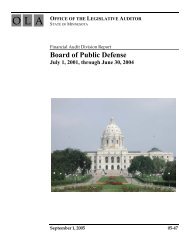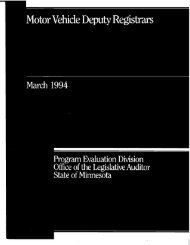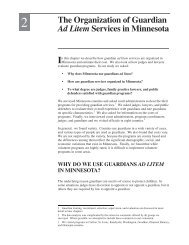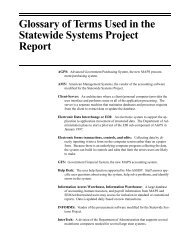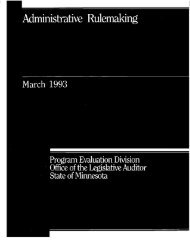Occupational Regulation - Office of the Legislative Auditor
Occupational Regulation - Office of the Legislative Auditor
Occupational Regulation - Office of the Legislative Auditor
Create successful ePaper yourself
Turn your PDF publications into a flip-book with our unique Google optimized e-Paper software.
72 OCCUPATIONAL REGULATION<br />
Although some boards are housed in state departments and use <strong>the</strong> same<br />
administrative support services as organizational divisions <strong>of</strong> <strong>the</strong> department,<br />
independent boards are essentially separate state agencies. 21 A critical difference<br />
between <strong>the</strong> board staff and departmental employees concerns who is in charge.<br />
The board staff’s activities are governed by <strong>the</strong> appointed board members. In<br />
most cases <strong>the</strong> boards prepare a separate budget on <strong>the</strong> basis <strong>of</strong> which <strong>the</strong>y receive<br />
an appropriation, and <strong>the</strong> boards are also required to submit a biennial report<br />
under <strong>the</strong> terms <strong>of</strong> Chapter 214 as we have already discussed.<br />
Some small<br />
independent<br />
boards can be<br />
abolished or<br />
subsumed by a<br />
state agency.<br />
Small independent boards buried in <strong>the</strong> <strong>of</strong>fices <strong>of</strong> state departments can lose <strong>the</strong>ir<br />
identity as separate agencies, yet <strong>the</strong>y are not subject to <strong>the</strong> same administrative<br />
and managerial controls as subordinate organizational units within a department.<br />
Of course, any decision to eliminate or consolidate boards would have to balance<br />
<strong>the</strong> claims made by proponents and opponents in a judicious fashion, so while we<br />
suspect some boards should be eliminated or consolidated, here we are only<br />
making <strong>the</strong> case, on <strong>the</strong> basis <strong>of</strong> our work, that a review might be fruitful and<br />
should be undertaken at <strong>the</strong> direction <strong>of</strong> <strong>the</strong> Legislature.<br />
One example is <strong>the</strong> Board <strong>of</strong> Assessors, created in 1971. The Legislature and <strong>the</strong><br />
Department <strong>of</strong> Revenue were concerned about <strong>the</strong> pr<strong>of</strong>essional qualifications <strong>of</strong><br />
assessors working for counties and o<strong>the</strong>r local units <strong>of</strong> government, and <strong>the</strong> board<br />
was created to establish and enforce pr<strong>of</strong>essional standards in <strong>the</strong> form <strong>of</strong><br />
licensing requirements. In its early years <strong>the</strong> board came under criticism from<br />
Department <strong>of</strong> Revenue <strong>of</strong>ficials who were concerned with excessive travel by<br />
board members to out-<strong>of</strong>-state conferences. While this problem was solved by<br />
subjecting <strong>the</strong> board to department policies, <strong>the</strong> department had to exercise this<br />
control indirectly through its power to appoint or reappoint board members. Over<br />
<strong>the</strong> years, <strong>the</strong>re have been o<strong>the</strong>r problems where <strong>the</strong> Department <strong>of</strong> Revenue and<br />
<strong>the</strong> Board <strong>of</strong> Assessors had a different view <strong>of</strong> proper conduct by board members<br />
and licensed assessors.<br />
By law, <strong>the</strong> Board <strong>of</strong> Assessors is appointed by <strong>the</strong> Commissioner <strong>of</strong> Revenue,<br />
and its board must include two Revenue Department employees. Currently <strong>the</strong>re<br />
is no staff director, one <strong>of</strong> <strong>the</strong> Revenue employees on <strong>the</strong> board serves as executive<br />
secretary <strong>of</strong> <strong>the</strong> board and supervises a single clerical employee <strong>of</strong> <strong>the</strong> board. The<br />
board did not submit a biennial report in 1996, and its staff was very vague in<br />
conversations with us about this responsibility. 22 Revenue department <strong>of</strong>ficials<br />
with whom we spoke did not oppose <strong>the</strong> idea <strong>of</strong> eliminating <strong>the</strong> independent<br />
authority <strong>of</strong> <strong>the</strong> board, although <strong>the</strong>y would probably want to retain licensing<br />
authority in <strong>the</strong> department. On <strong>the</strong> basis <strong>of</strong> our brief review, <strong>the</strong>refore, it appears<br />
that <strong>the</strong> Board <strong>of</strong> Assessors may be one independent board that should be<br />
considered for elimination.<br />
21 The Board <strong>of</strong> Assessors, The Board <strong>of</strong> Private Detectives and Protective Agents, and <strong>the</strong><br />
Board <strong>of</strong> Teaching are housed in department <strong>of</strong>fices, and <strong>the</strong> first two are appointed by department<br />
heads. See Table 2.4 on page 34 for additional details.<br />
22 Presumably as a result <strong>of</strong> <strong>the</strong> conversation, <strong>the</strong> Board completed a report for <strong>the</strong> biennium<br />
ending in fiscal year 1998.



